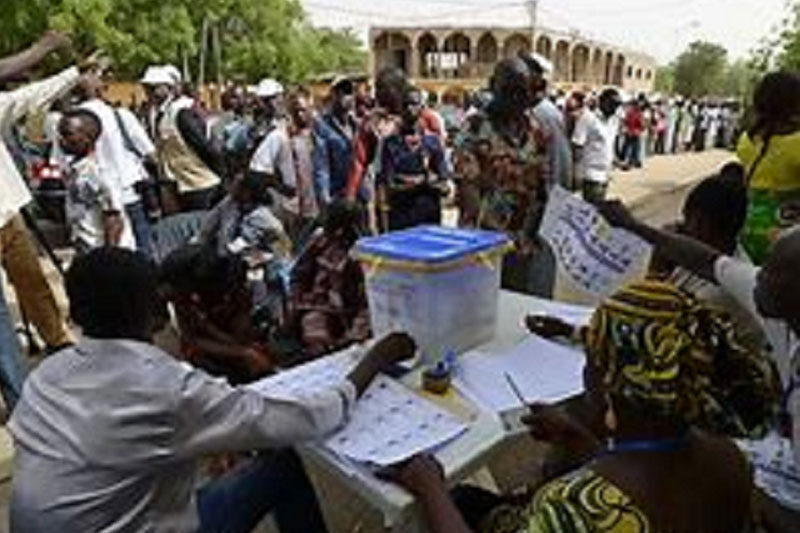Internally displaced persons (IDPs), who remained in Maiduguri after the Borno State government shut down all the official IDP camps in the capital city, are worried that they might not be able to vote because they are now living in areas that are different from the addresses on their Permanent Voters cards (PVCs).
They said they did not even know if they could vote in Maiduguri and might have to return to their ancestral villages to exercise their constitutional right. They said if this was the case the government should pay for transport to get them back to their hometowns or they should organise polling booths in the city where they could vote.
Modu Zarami told RNI that he was a displaced person originally from the Kukawa Local Government Area of Borno State. Initially, he said, he lived in the Gubio IDP camp before it was shut down.
“But now I’m living in a rented house here in Maiduguri. When we were living inside the camp, we had polling booths in strategic locations and we were able to participate and exercise our constitutional right to vote for any candidate of our choice in every election. But now the camps have been closed and some IDPs have resettled in their respective hometowns. They, at least, will be able to vote but we don’t know if IDPs like us in Maiduguri will also be able to vote. “We are not in the same area as the polling booths in the vicinity of the camps and we are not in our hometowns, so we don’t know if we will be allowed to vote. Where we live now is not captured on our PVCs.
“The reason we decided to stay in Maiduguri was that our hometowns are in remote villages which are inaccessible and security is still a problem. So, we decided to continue to live here.”
Zarami said most of the IDPs had permanent voters cards (PVCs) but they were still not sure they would be able vote. He said there were not many of them left because most had returned to their hometowns.
“So, I don’t think our voices will be heard and we are worried that we won’t be able to vote unless we return to our ancestral hometowns.”
Ya Fanna Mattaram, an elderly displaced woman, said: “I’m an IDP originally from Gajiganna town of the Magumeri Local Government Area of Borno State but I’m now living in Maiduguri because of continuing insecurity in my hometown. During peacetime – before the insurgency – we participated in every election. But then we were displaced because we had to flee from rampaging insurgents.
“Since we came here, as displaced people, we have not participated in any elections. I am asking the government to establish a polling booth here or to resettle us in our remote villages but with stringent security measures in place so that we can exercise our rights to vote in peace for the candidates of our choice in the coming elections.”
Abukar Modu said: “I’m a displaced person originally from Gulumba town in the Bama Local Government Area of Borno State. Initially, we used to live in the Dalori IDP camp before it was officially shut down by the government. Most IDPs from Bama have returned to their hometowns. Only a few of us decided to stay here in Maiduguri because, even if we returned, our remote villages cannot be accessed because of insecurity.
“When we were taking refuge at Dalori camp, there were polling booths provided by the government which enabled us to participate in every election. But now the camps have been shut down and the 2023 elections are already around the corner.
“We don’t know if we will be able to vote because we are living in a different area to the camp. We are appealing to the government to address this issue by providing polling booths in the host community where we live so that we can vote. Either that or the government must provide free transportation to Bama so that we can vote there.”
Abba Liberty, a public relations officer of the Borno State chapter of the Independent National Electoral Commission (INEC), told RNI that it was the commission’s duty and responsibility to serve the public in the correct way so that they could exercise their right to vote.
“Those IDPs who registered and obtained their PVCs while taking refuge in various camps were using their cards to participate in every election until all the official camps were shut down by the government.
“Those IDPs should be informed that they can cast their votes in their respective polling units or polling stations as contained on their PVCs.
“Because of insecurity, we have held awareness campaigns and used various media organisations – radio, print and online – to explain voting procedures and where electorates, especially IDPs, can cast their ballots.”
Liberty said INEC had consulted with government officials, local authorities and security operatives and would organise a meeting to ensure IDPs and others obtained first-hand information and security tips on all the locations where voting could take place.
“We are working hand in hand with security operatives seeking their advice before informing the IDPs where they should cast their votes. Once we receive clearance from them, we will be able to inform people of a particular place where they can vote. That’s our job.”
SHETTIMA LAWAN MONGUNO






